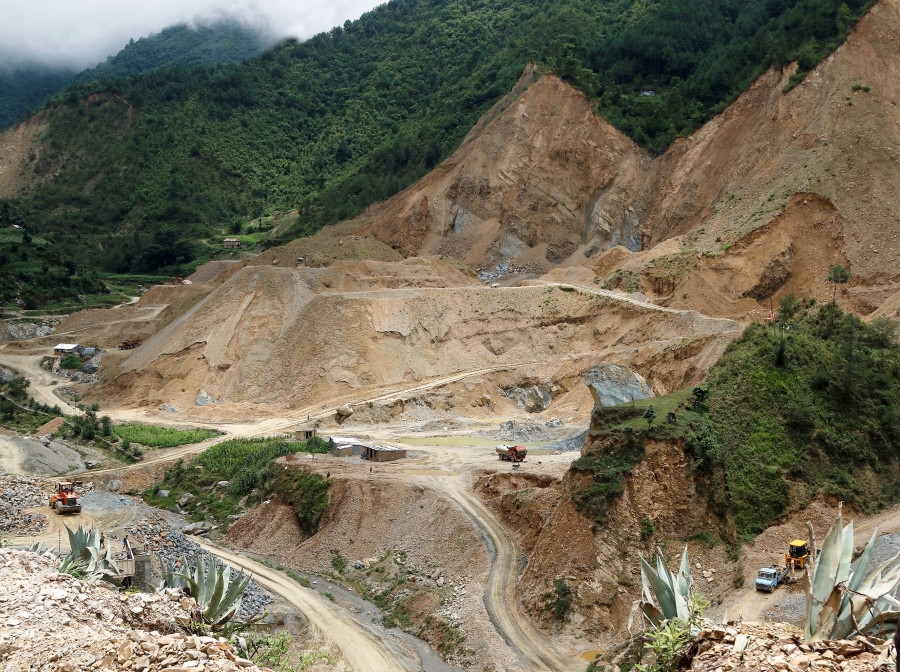Columns
Climate justice at home
Dozer owners are altering our landscape in the name of land development for housing or road connectivity.
Madhukar Upadhya
Loss and damage funding is finally an agenda item of the Conference of Parties (COP) negotiations this year, 30 years after the idea was first introduced. The funding refers to finance aimed at addressing unavoidable climate change catastrophes that developing countries are particularly vulnerable to—a move designed to make polluters pay for the damage they caused. Much work still needs to be done in terms of mechanisms and criteria to determine what qualifies as climate-induced disasters and how much compensation needs to be allotted. It’s one part of the climate change negotiations at the COP 27 meeting. The other part is more contentious and, therefore, a harder nut to crack—drastic cuts in emission within a short period of time to achieve the 1.5 degrees Celsius goal set by the Paris Agreement.
The latest figures released at the summit show global carbon dioxide emissions from fossil fuels are soaring and likely to increase by 1 percent in 2022. Therefore, the general consensus seems to be that COP must admit that the 1.5 degrees Celsius goal is dead.
One doesn't need to be a climate scientist to understand the grim consequences of a warmer world. As long as we continue pumping energy equivalent to seven Hiroshima atomic explosions into the atmosphere every second unabated (an increase from four such bombs every second in 2013), the rate at which the climate is changing will only escalate. In the last decade alone, the world demonstrated a callous, near-belligerent disregard for the climate.
Oil explorations
With an ongoing energy crisis courtesy of the Russian aggression in Ukraine, fossil fuel proponents can justify more oil exploration in the name of energy security even though it'll take years for these projects to be operational, with no impact on the current energy crisis. Almost all companies have plans for more exploration. They've been planning to invest $160 billion in expansion since 2020.
The richest 10 percent of the global population, the ones who influence global policies, emit 49 percent of global emissions, while the bottom 50 percent, who tend to be the victims of the climate consequences, account for only 10 percent. Therefore, it must be noted that the rich are responsible for reducing emissions.
While loss and damage has taken centre stage in global negotiations, the demand to phase out fossil fuels has also been rising simultaneously. However, limited growth and supporting loss and damage seem to be mutually exclusive. One needs to remember that current international finance flowing to the developing countries for adaptation is between five to 10 times less than what is required—current projections determine they will need around $340 billion per year by 2030. Loss and damage will add further pressure to this demand for funding.
Economic progress continues to be prioritised over climate justice, with decision-makers conveniently ignoring the fact that the climate crisis is a direct result of pursuing economic progress over nature’s capacity above all. Unfortunately, the sheer number of fossil fuel industry representatives and lobbyists at Sharm El-Sheikh is an omen of this—governments may choose to accept trivial projects to balance emissions such as net zero in the next three decades instead. Electric vehicles are a welcome change, but they won't replace all internal combustion engine vehicles or private jet planes within this decade. After all, symbolic gestures can only go so far.
Under the given circumstances, aggrieved scientists and activists, who see the oncoming dangers, have started protests like “Just Stop Oil” and blockading private jets at airports. The sentiment behind these actions was echoed in the UN Secretary General’s words, "We are on a highway to climate hell with our foot still on the accelerator."
Should the Pakistan floods, drought in Somalia, heat waves in China and Europe, or wildfires across Australia and parts of the United States occur more frequently, there will be a catastrophe on an apocalyptic scale. Any efforts to rebuild the economy or restore the damage caused by such disasters will take years, if not decades, depending on a country’s economic resilience. Similar disasters may repeat within that period because the recurrence period of disasters of such scale isn't known yet. Getting into a vicious cycle of more emissions leading to more disasters and, therefore, to increased demands for more funding for loss and damage is not an acceptable scenario. So the “Just Stop Oil” protests and blockades of private jets continue with a simple message: Stop the unchecked exploitation of the planet.
Climate justice at home
Coming back to Nepal, much of these discussions may not be as pertinent as most of them are global in nature, but the rising cost of living, energy security, food security and a progressively degrading environment caused by landslides and floods are crucial for us domestically. Some of these problems have been aggravated by wealth inequality within our society. We have large emitters in Nepal too—the rich who are responsible for a large portion of our national emissions. Why not tax them for the carbon dioxide they emit beyond average emitters? Individuals and companies who own fleets of gas-guzzling SUVs should be charged for the greenhouse gases they emit, in addition to the existing environmental tax.
Dozer owners, in collaboration with the private sector, are altering our landscape in the name of land development for housing or connectivity through roads or sand and gravel mining. This destruction of natural habitats and water sources has often led to the drying of springs and subsequently landslides and debris flow, destroying farms and houses. Why not hold them accountable for such loss and damage? As global negotiations stall over rich countries' reluctance to even listen to loss and damage arguments, we can't afford any more delays in pursuing climate justice and an action-oriented approach to addressing the climate crisis. We can continue advocating for climate justice at global fora, but we should also pursue it at home by making polluters in Nepal pay part of their profits as compensation for the damage they cause.
Nepal has a unique opportunity to become a pioneer and an exemplar in this regard if we take the necessary steps. With the elections on our doorsteps, here's hoping that we choose responsible and sensible candidates to make this a reality.




 11.54°C Kathmandu
11.54°C Kathmandu















